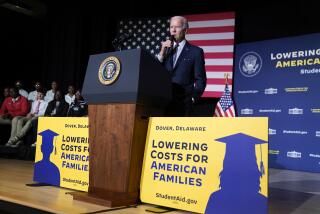Venezuela Will Delay Paying Debt Principal
- Share via
In a surprise move, the outgoing president of Venezuela said Saturday that the fourth-biggest debtor in Latin America is suspending principal payments on nearly all of its $30.3-billion debt to foreign banks.
The move was not as drastic a step as halting interest payments, but it highlights a hardening of attitudes among Latin American leaders over the worsening economic situation.
Enormous Toll Reflected
Venezuela, a leading oil exporter, has been a model debtor nation and was the only big Latin American debtor to continue making principal payments through the 1980s. But the decision Saturday reflects the enormous toll being taken on Latin American countries by huge debt payments to foreign banks.
The debt crisis, which is entering its seventh year, has choked off growth in many Latin American economies as earnings are devoted to paying foreign debt instead of financing local growth. Latin American leaders have warned that declining living standards threaten the region’s political stability and its fledgling democratic governments.
President-elect George Bush said in December that he will order a major review of current U.S. strategy for dealing with Third World debt. He told reporters that “we’ve got enormous problems, particularly in our own hemisphere, with Third World debt.”
In a nationwide television address announcing the Venezuelan suspension of payments, President Jaime Lusinchi said, “The problem of foreign debt today strangles the economic and social development of the great majority of the world’s peoples.”
Oil Revenue Slump
He said he had ordered the suspension, effective Jan. 17, because of the slump in revenue from oil exports and what he said were high interest rates on the debt. Lusinchi said that Venezuelan officials plan to meet soon with their leading creditor banks to negotiate new terms on the loans.
A U.S. banker familiar with Venezuela’s position said the country wants to reduce its loan payments by stretching out the terms of its existing loans.
Between 35% and 40% of the $30.3 billion is owed to U.S. banks. Chase Manhattan Bank in New York is Venezuela’s leading U.S. lender. San Francisco-based Bank of America is the second-largest creditor, with $1.1 billion in long-term and medium-term loans.
Donald K. Crowley, a banking industry analyst in the San Francisco office of the investment firm of Keefe, Bruyette & Woods, said the suspension’s impact on U.S. banks would be minimal because none is overexposed in Venezuela. But he said the Venezuelan action came as a shock and would be significant if it represented a move among Latin American nations to adopt a common approach to dealing with foreign creditors, which would give them more bargaining leverage.
Colombia’s Suspension
On Friday, Colombia said for the first time that it was suspending payment on its $16.5-billion foreign debt for three months until a new $1.7-billion international loan is received.
Louis G. Schirano, an executive in the New York offices of Los Angeles-based First Interstate Bancorp., said he did not interpret the Venezuelan move as a major setback. He said that Venezuela, which will continue paying interest on its debt, has simply joined the other Latin debtors in suspending its principal payments.
“What banks really care about is the debt service (interest) and that will still be flowing,” said Schirano, whose bank has divested itself of all Venezuelan debt.
Latin America’s largest debtor nations are Brazil, $113 billion; Mexico, $108 billion; and Argentina, $54 billion. Unlike Venezuela, all three have halted interest payments to foreign banks at various times.
Debt Action Urged
The presidents of all four nations, along with three other Latin American countries, have urged the United States to make the debt problem a major political priority. Bush’s remarks about reviewing U.S. efforts have been interpreted in some quarters as a move to possibly forgive some portion of the huge debt owed to private banks by Third World countries.
The previous U.S. strategy for dealing with the problem, the so-called Baker Plan, was designed in 1985 by then-Treasury Secretary James A. Baker III, who will be Bush’s secretary of state. He called for commercial banks and the World Bank to provide new loans in return for growth-oriented economic changes in the debtor nations.
But new lending has been rare. The 17 countries that are most deeply in debt owe $529 billion and paid $14 billion more to creditors than they received in new loans in 1987, the latest year for which figures are available.
A U.N. development organization said in September that commercial banks should forgive at least 30% of the amount owed by the 15 most heavily indebted Third World countries. The U.N. Conference on Trade and Development said that was the only way of giving the nations the opportunity to retain enough capital to grow faster and repay the remainder of the debt.
While Venezuela’s economy is in better shape than that of most of the other debtors, the sharp two-year decline in oil prices has caused problems.
On Friday, the government raised tariffs sharply to restrain imports and conserve its cash reserves. Tariffs were increased as much as 160% on about 500 consumer items, ranging from electronics to liquor.
More to Read
Sign up for Essential California
The most important California stories and recommendations in your inbox every morning.
You may occasionally receive promotional content from the Los Angeles Times.










